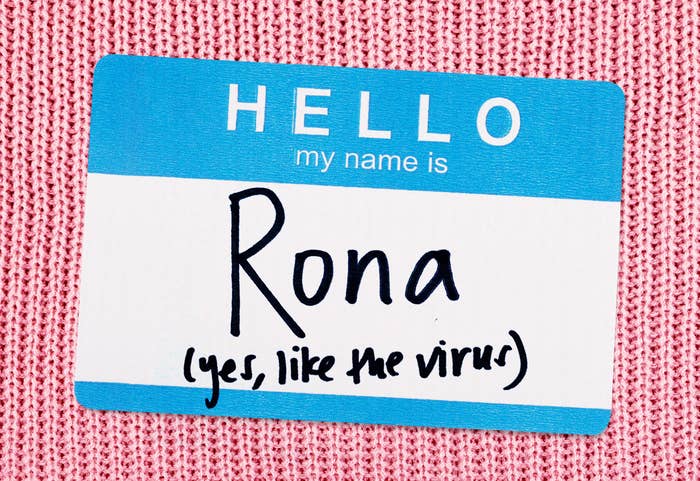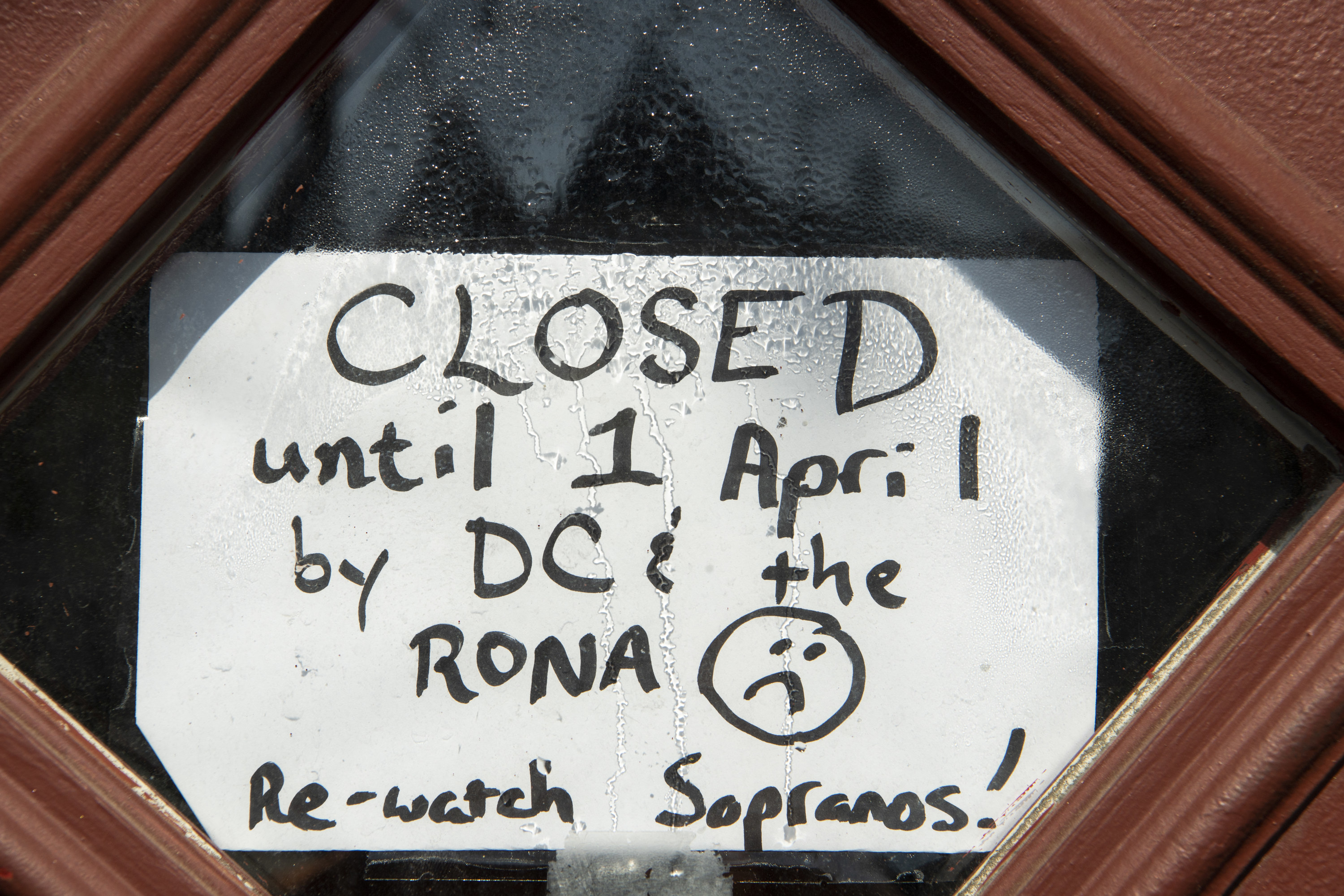
She had turned up for a COVID-19 test at a clinic in Washington, DC, when the staff finally called her in for her appointment.
“They asked me my name and I said, ‘I’m Rona,’” said Rona Hoang, 30, “and they said, ‘No, we know you’re here for a COVID test. What’s your name?’
“And I’m like, ‘No, my name is Rona.’
“Everyone was kind of chuckling and laughing. I was genuinely laughing along with them,” she said, “but then when I left, there was part of me that was like, should I be mad?”
It’s been a tough year for Ronas. Ever since the coronavirus spread around the world and upended all our lives in significant and ghastly ways, people named Rona have also been hit with a series of silly microaggressions and jokes related to their names.
“My 15-year-old insists that nobody calls the coronavirus ‘the rona,’ but I see it all over Twitter,” said Rona Kobell, 48, a longtime reporter in Maryland’s Chesapeake Bay who is now running a new nonprofit focusing on environmental journalism.
“I introduced myself to new neighbors, and it was clear they didn’t get my name,” she said, “and so I repeated it a couple of times, and then I was like, ‘Rona...like the virus,’ and they were like, ‘Oh! Nice to meet you!’”
2020 introduced a bunch of pandemic-related words to our daily lexicon — think “social distancing,” “quarantine,” or “lockdown” — but as BuzzFeed News’ copy editors (and language experts) noted in December, people quickly grew tired of saying convoluted terms like “the novel coronavirus” or “COVID-19” and invented some slang. “Colloquially, people soon abandoned any semblance of an appropriate tone,” the copy editors wrote. “The virus became ‘the ’rona.’”
A San Diego Union-Tribune story noted this “rona” phenomenon in the US as early as March 25, 2020, while the Daily Mail had five days earlier credited Australians with coming up with the word in keeping with the Aussies’ penchant for abbreviations: “An Australian might say: 'Me boss tested pozzi for The Rona, so now I'm in iso,’” the Mail wrote.
But the origins of “rona” are unclear. Although the phrase was first being used on Twitter in reference to the coronavirus in late January (well before most people were talking about COVID), it seems likely that the term was popularized — as is the case for a lot of slang — among Black and LGBTQ communities.
A search of news archives reveals that Thabiso Mahlape, a South African publisher and columnist, was one of the first to publish the term in a news story in a March 16, 2020, story in the Sowetan, a South African newspaper, titled “Maybe the 'rona' can save our lost humanity if we let it.”
“Spend time with your loved ones and do the things that bring you joy,” she wrote in the piece about social distancing. “Allow the ‘rona’ to give you this much-needed break.”
Mahlape told BuzzFeed News she’d seen the word used on Twitter and thought it would be an accessible way to write about the virus. “South Africans deal with pain by laughing,” she said. “We laugh our way through hurt and fear by making jokes and giving things names.”
She couldn’t quite remember what tweet she’d first seen using “the rona,” but said this one, which compared African people with Black Americans and had gone viral earlier, might have been the one:
Between Africans calling the virus “Coro” like it’s a pet name and Black Americans calling it “The Rona” like it’s a mythical strain of weed I AM DONE
As far as we can tell, the first use in a US news publication was a March 19 column in the St. Louis American by Delores Shante, a fictional Black columnist whom the paper has used to write about nightlife for over three decades. Her story about the first lockdowns described “rona restrictions and people’s initial shock at the unfolding pandemic. “I will be doing everything humanly possible to protect myself from ‘The Rona,’” the author wrote.
The Black woman writer behind the Delores Shante pseudonym, who asked to remain anonymous, told BuzzFeed News she’d first heard her Black gay friends call the virus “Miss Rona” early on in the pandemic. “I didn't want to people to think I was associating the virus with a particular gender,” she said, “so I just replaced the ‘Miss’ with ‘the.’”
Other Black women on Twitter had been calling the virus “Lady Rona” and “Miss Roni” as early as March 12:
@anotherjudy Miss Roni makes it seem like she’s actually a nice but misunderstood lady with finger waves
According to Google Trends, searches for the word “rona” exploded in mid- to late March and remained about twice as high for the rest of 2020 as they had for previous years.
However it first came about, “rona” is everywhere now. Donald Trump Jr. and Baltimore Ravens cornerback Marlon Humphrey each announced their positive COVID-19 diagnoses by saying they had “the Rona.” Saturday Night Live ended 2020 with a sketch about “A Rona Family Christmas” in which a family of sentient coronavirus particles argue during the holidays. Even Dictionary.com lists it as an entry for COVID-19 slang in this example sentence: “I’m not even trying for a beach body this year, since rona ruined my summer plans.”
“The first few months, it was kind of annoying, but I’ve learned not to take it seriously,” said Rona Fernandez, a writer in the Bay Area. “Nobody I care about uses it [to mean the coronavirus] — at least not to my face.”
The word “rona” has even been adopted by governments for public health campaigns from Utah to England.
Rona Danziger, who works in digital marketing outside of Detroit, said she frequently encounters billboards and radio ads for Michigan’s “Rona for Real” public health awareness campaign that personifies the virus as an ominous threat that “loves to wreak havoc.”
“The whole point [of the campaign ads] is ‘Rona will ruin your party. Rona will ruin your cookout.’ They’re everywhere!” said Danziger. “I found it really humorous and made one of the pictures my Facebook profile picture. You have to laugh about it.”

All the Ronas interviewed for this story said that while they take the virus seriously and have been horrified by the destruction it has caused, they can also appreciate the humor in the unfortunate happenstance of their names.
“I think it gives people a little bit of comfort to shorten it. It makes it something we can all deal with,” said Kobell in Maryland. “So I’m not that upset.”
“I’ve tried to have a sense of humor about it because it’s so bizarre that it’s turned into this thing,” said Danziger, “and now I think, Hey, at least they’ll know how to pronounce it and spell it.”
Indeed, the women said the popularization of “rona” as slang has helped non-Ronas become more acquainted with their name.
Rona — which has origins in Hebrew, Arabic, and Scottish Gaelic — hasn’t been particularly common as a name in the US for some time. It fell out of the top 1,000 most popular girls’ names here in 1970, when there were just 138 Ronas born, according to the Social Security Administration. (The boom year for Ronas was 1942, when the name was the 779th most popular).
That means being a Rona can sometimes be a lonely experience. “You don’t see that many Ronas out there,” said Hoang in DC. “I always get excited when I meet another Rona.”
Some Ronas even resented their unique names growing up. “When you have a name like Rona and you go to Disney World or Yosemite and you go to the gift shop looking for one of those keychains, they never have your name,” said Kobell. “It’s always kind of a bummer.”
But now, through events totally beyond their control, life has changed for Ronas everywhere.
Like Kobell, Danziger has compared her name to the virus when introducing herself to her new neighbors, as well as others she encounters. “When people can’t understand what I’m saying on the phone to order carryout they’ll say, ‘You mean Mona?’ and I’ll say, ‘No. Rona. Like the virus.’ And they’ll immediately get it,” she said.
Danziger even works in an office where her suite number is C19: “My boss likes to joke, ‘Come to suite C19 and check in with Rona. She’ll take care of you!’”
She and Kobell don’t know one another, but they’ve each had debates with women in their lives who have another very 2020 name about who has suffered more. “I’ve told my friends who are named Karen, ‘Hey, at least your name isn’t Rona!’” said Kobell.
There are also men who know what it’s like being Mr. Rona. Daniel Rona, a 23-year-old artist in Columbus, Ohio, said his friends have called him by his last name all his life. “It was always correlated to the Corona beer, so it was interesting to see it shift pretty drastically from ‘a ‘Rona with a Rona’ to a pandemic-related name,” he said.
In a twist of fate, he started signing his paintings with just his last name in January 2020 — unaware of all the Rona jokes that were to come. “You definitely get these knee-slapping jokes from people once they recognize my name and try to turn it into a joke. It becomes weird,” he said. “They’re like, ‘Oh, don’t want to get that! Staying away from you!’”
Not every Rona wants to be associated with the virus, of course. Representatives for Canada’s Rona hardware store chain, a subsidiary of Lowe’s, declined to comment for this story, as did a spokesperson for the River Oaks Neighborhood Association in San Jose, California, which holds monthly RONA meetings for residents.
But the Ronas who did speak with BuzzFeed News said they appreciate the jokes — to a point.
“I would say that I hope a lot of the real Ronas find the humorous side of it, but maybe not to push us too far,” said Hoang.
She added, “Me and my friends have a group chat and they called it ‘the rona’ in there, and I had to double-take because I thought they were talking about me. I try to see the humorous side of it, but there’s a little bit of me that’s like, come on. You know me, so you can’t use that.”
